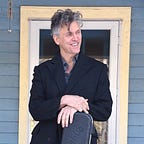’Tis of Thee: On Being an American in 2021
After the White Supremacist Insurrection on the Capitol, I pull my American passport from a drawer, feel its heft in my palm. It is the fourth one I’ve owned.
This little blue totem focuses my thoughts, sharpens my realization that this democracy, or representative republic, has of late teetered on the brink of being something else, namely an autocratic fascist regime. The depth of emotion this evokes in me is significant. Lacerating, even.
What hangs in the balance, as far as I’m concerned, is the land of Charlie Parker, Tennessee Williams, Stacey Abrams, Katherine Hepburn, Questlove, Arthur Miller, Johnny Cash, Eleanor Roosevelt, Jackson Pollock, James Brown, Jonas Salk, James Baldwin, Jack Kerouac, Howard Zinn, Toni Morrison, The Ramones, Woody Guthrie, Emily Dickinson, Lin-Manuel Miranda, Janis Joplin, Star Wars.
The passport propels me through decades to September, 1986, the first time I ever felt like “an American.” The memory rises to the surface unbidden, seemingly of its own volition.
I was twenty-one. I’d been living in New York City a year and a half, and had found an apartment, a band, a couple jobs, companions, and most important, independence. I bleached my hair. I saved enough cash from tending bar to visit London, and a town near Nuremberg called Fürth.
I can still conjure the thrill of my first transatlantic flight. First passport at my hip. Photos show me wearing suspenders, a goofy smile, and a billowy 80s shirt. I traveled alone, didn’t make many plans, went with the wind, took trains, lived on the cheap, enjoyed the kindness of strangers. With a dear companion I traveled to Munich, drank the best beer. I walked the profoundly ugly Berlin wall, showed my passport at Checkpoint Charlie and spent a day in diesel-smelling East Berlin, unstuck in time.
All around me were ghosts of WWII, “the war to end fascism.” Bullet holes remained in walls, craters were unfilled. Some buildings had not been rebuilt. My companion told me the lack of rebuilding was intentional, so that none would forget Germany’s descent into fascism, so none would forget the Nazis, and what Hitler and his henchmen had quite successfully wrought. The entire country had not quite shaken off that toxic dust, forty years on. This was no accident, but a choice, a kind of collective repentance.
While in the East, I saw a ballet, ate yogurt from a small shop. The East German marks were so flimsy they crumbled in the pockets of my coat, where I also kept a picture a beautiful young German woman had drawn of me, a sketch I still own, in which I am playing my bass, surrounded by American flags.
I felt no deep emotional connection to the war, or to the Allied Forces victory that had shaped everything I was experiencing, yet people frequently told me I was so American. (Except for my bleach blonde ‘do, which everyone said reminded them of Bowie, which of course was my intent.) Like every American, I had apparently been configured by my country, whether I wanted to be or not. And as a wayfaring, wide-eyed twenty-one-year old, I dimly thought that made me very lucky indeed. I knew — and know — my country’s deep shame of slavery (I was raised in the Deep South), its ongoing humanitarian crimes, and I was — and am — deeply conversant in the continuing problems that need correction, most of them based in institutional racism. But at that time, I was glad to be who I was, and where I was. Then my thoughts were pulled elsewhere.
I was gone a month. It was a life-changing, romantic adventure. As much fun as it was, however, I was surprised at my eagerness to return to New York City, USA. My life — the yet-to-be-lived life that would lead me to this moment — was calling.
I got a train from Berlin to Frankfurt, and flew from there to JFK. I recall nothing of the flight home (I probably caught up on some sleep), but I do remember going through customs. A jovial, blue-uniformed African-American New Yorker sized me up. He seemed to know exactly where I’d been and what I’d been up to. He grinned, took my passport, and said:
“Welcome home.”
A wave of emotion hit me. Indeed, I was home, and glad to be. I was not some rootless, wandering, life-in-a-suitcase, leave-in-a-cloud-of-dust nomad. No. I was, and am, an American. I am the descendant of immigrants and indigenous people. A mutt. I am of this particular soil, part of a story in which I have increasingly, consciously engaged ever since.
To keep the story advancing in the right direction is much more work than I thought it would be. But the option to move that needle feels ever more precious. To my marrow, I am invested in an America that edges closer to ideals that have brought to me the most amazing people and experiences, the songs, stories, and spirit that have been so much a part of the richness of my life, and the lives of friends, loved ones, and tens of millions of wildly different people I will never meet.
Despite recent horrors, the promise of a country more like what I’m describing is closer than it was just a few weeks ago. And the delusional white supremacists who would raze the Capitol, build a wall, and murder those who are not like them, are as terrified as their man Hitler was in his bunker. Unlike him, however, they aren’t going anywhere, and of this we must be mindful, sober, and active.
The Capitol stands, and change is afoot. And next time I travel to another country, I will proudly take that change with me, in my passport. And then I’ll come home, and get back to work.
RBW, Phoenicia, NY, 1–13–21
